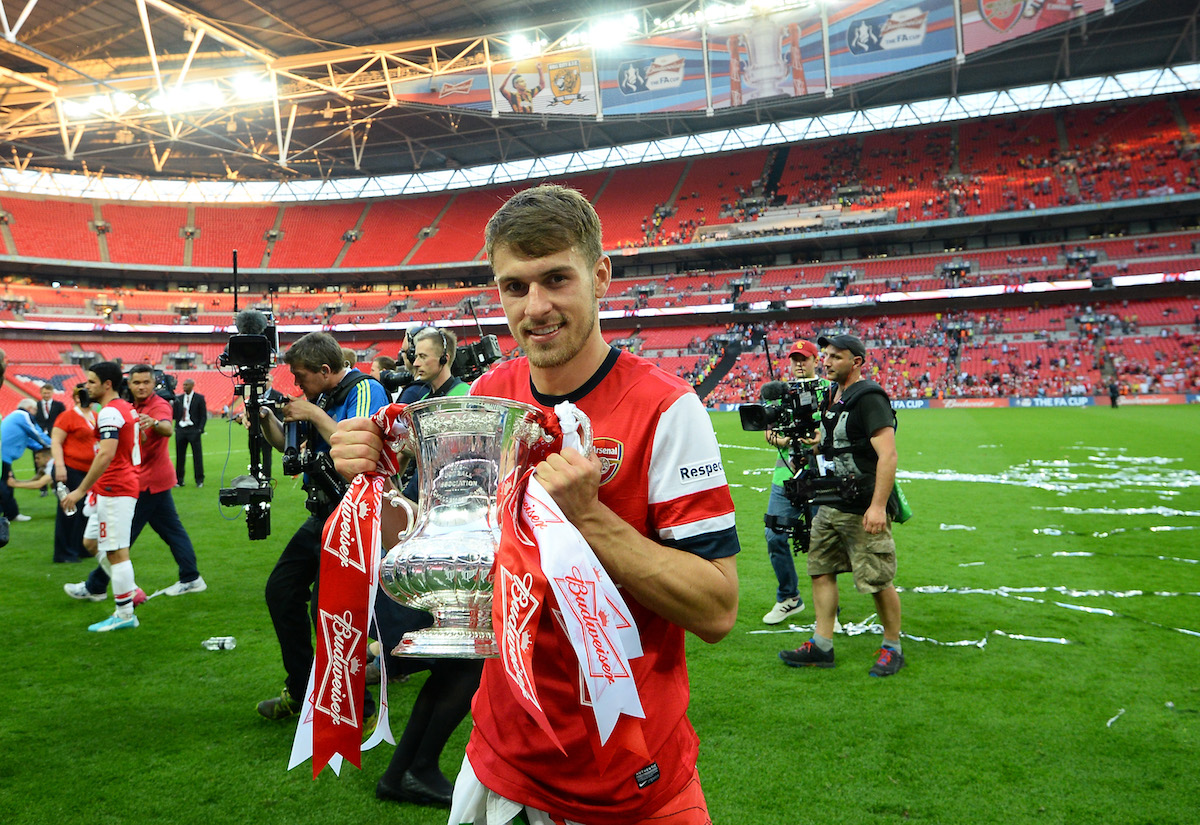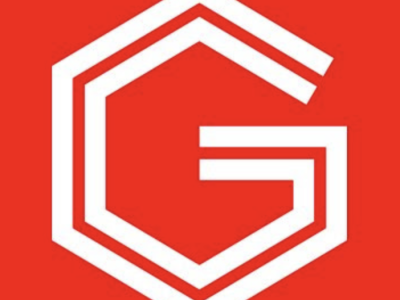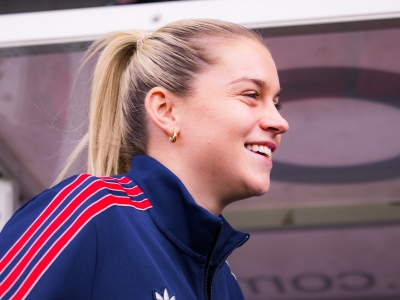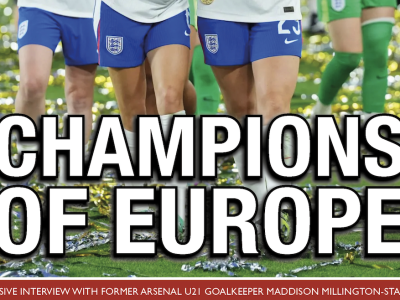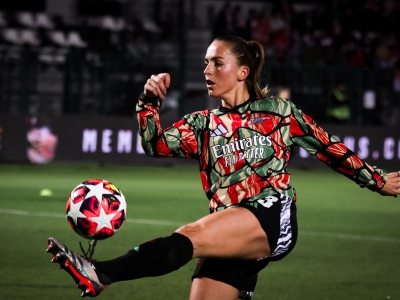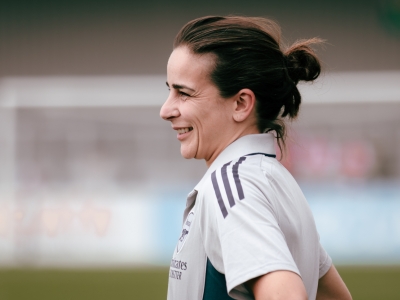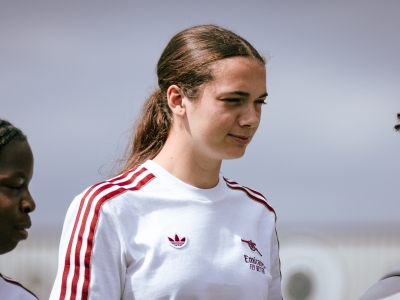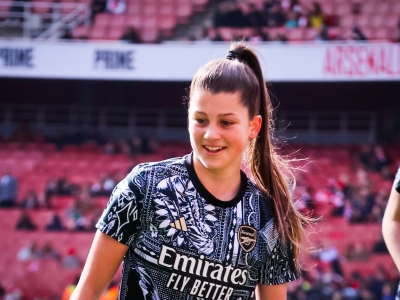By 1993, the Football world had changed dramatically from that of Arsenal’s last FA Cup Final appearance of thirteen years prior. In 1980, Arsenal’s Cup final appearances were two of just four games shown live on British television all season. In 1992/93, in the English top tier alone - which that season broke away from the rest of the Football League - there were sixty games shown live on television (albeit on BSkyB – a satellite network then subscribed to by just 1% of the UK population). The FA Cup had lost its position as a scarce live televised Football attraction and after Wimbledon’s Crazy Gang defeating Liverpool’s Culture Club in 1988 was no longer on both ITV and BBC, but exclusively on just one of a growing number of available TV channels. However, the FA Cup Final was still to some extent held a position of ‘must-see’ TV for the vast majority of Football fans.
The Cup Final song, a phenomenon gradually phased out over the years, still prevailed. Arsenal’s star attraction on the pitch, Ian Wright, made his own stab at the pop charts earlier in the year with the help of Arsenal fan Chris Lowe of the Pet Shop Boys, doing his best Roachford impression with ‘Do the Wright Thing’. The official Cup Final song however was this reasonable offering from British Reggae acts Peter Hunningale and Tippa Irie, titled ‘Shouting For The Gunners’ which reached number 34 in the UK singles chart. Far from risking becoming the Reggae Chas & Dave, post-World in Motion the Football song now held a degree of semi-respectability.
In 1980, Spandau Ballet’s Gary Kemp, a childhood Arsenal supporter, openly admits to relegating Football to the back of his extravagant closet, stating that: ‘here was a period when I started to hide the football side away. You wouldn’t go to the New Romantic nightclubs, such as Billy’s or The Blitz, and talk loudly about football’. By 1993 however, celebs were queuing up to climb aboard the bandwagon, however this is not something one could accuse Tippa Irie of, who as early as Football’s ‘annus horribilus’ year of 1985 was proclaiming himself on vinyl to be the ‘Most Faithful Arsenal supporter’, despite the club being trophyless since 1979 and banned from Match of the Day for being too boring to watch.
The one remaining constant between 1980 and 1993 however had been David O’Leary’s presence in the Arsenal squad. The only surviving member of the triple Cup-Finalists of the late seventies/early eighties, O’Leary had clocked up over seven hundred appearances in the Red and White, but was now on his way out of Highbury on a free transfer at the end of the season, at the age of thirty five. O’Leary had believed that his parting gift had been a League Cup Final start against Sheffield Wednesday a month earlier, replacing a suspended Lee Dixon at right back, which Arsenal won 2-1. However, he would end up playing his 722nd and final game in the red and white at the FA Cup Final at Wembley.
Arsenal were again playing Sheffield Wednesday in the FA Cup Final, however much of the gloss had been taken off the final due to the fact that both sides had become so over-familiar with each other that they had cancelled each other out to the point of stalemate. It was much criticised by the neutrals as a drab affair and ended 1-1. As well as the League Cup final, there had also been a dull away fixture at Hillsborough crammed in on a Thursday evening which Wednesday won 1-0. Both finals against Wednesday were also notable as being the first time in English football that a squad numbering system and player’s names on the backs of shirts was to be implemented (now such a fixture in the game that barely anyone can remember the days of players numbered from 1-11 on the basis of their position, making this 30 year old gag from Brian Conley obsolete).
It also turned out to be the very last time the FA Cup Final required a replay. Now that they are officially abolished beyond the Quarter Finals, it strikes as odd that in an era of endless replays, Wembley had to wait until 1970 before an FA Cup Final actually ended in a draw. The 1993 Final became the fifth in twelve years to require a replay, though was the first since the introduction of penalty shoot-outs should the second game of a tie still be level. The fear of the dreaded shoot out lottery however was countered by the relief that a definite end to a protracted sixty plus game season was in sight.
Astonishingly, Arsenal honoured David O’Leary’s farewell testimonial just forty eight hours after the first game, the opposition being newly crowned Premiership champions Manchester United (celebrating their first title in twenty seven years) which ended in a 3-3 draw with the Man United defence allowing O’Leary to run through at the end and slot away the equaliser. Even more astonishing however was the fact that Sheffield Wednesday’s Roland Nilsson played a competitive World Cup Qualifier for Sweden against Austria in Stockholm just twenty-four hours prior. Nilsson was only able to do so because the replay, like all other Wembley replays, was played on the Thursday night after the Final.
Long before the conversion of the UEFA Cup to the Europa League format, Thursday night was meant solely for the like of Top of the Pops (FA Cup final replay prelude episodes were often condensed affairs, which the great John Peel turned to his advantage while co-hosting with Blondie’s Debbie Harry in 1982), Crimewatch, Question Time and classic comedy such as Blackadder or Red Dwarf – on Thursdays, Football tended to be the last thing on anyone’s mind. So why it became the norm to replay the FA Cup Final on a Thursday night, I’ve never heard a sufficient explanation for (I can only assume that Brent Council would only allow events to take place at Wembley at five days’ notice).
This, coupled with the cost of dragging themselves to Wembley four times in just seven weeks, had meant that Sheffield Wednesday fans were unable to fill their allocation, making it the first time ever that a Wembley Cup Final had failed to sell out, the official attendance of 62,267 was just a little over the present day capacity of the Emirates Stadium. Outside of N5, the replay was also another fixture that would hardly be remembered as a classic. Like 1979, it was to be decided in typical Arsenal fashion – a 2-1 victory with a goal in the last minute from Andy Linighan, who joined a long list of Wembley injury-related heroics, such as that of Roy Dwight and Bert Trautmann (even Steve Morrow who broke his arm in post-match celebration in the previous month’s League Cup Final). Linighan finishing the final with a broken nose inflicted by an Elbow from Mark Bright, as well as two broken fingers!
In his post-match interview with the BBC, in reference to his nose injury, Linighan dryly remarked that he: ‘certainly won’t be picking it for a while!’ Twenty-one years on however, Linighan gave a more elaborate recollection to Arsenal Player as seen here. In the years between 1993 and Arsenal’s next final five years later, Football was to change further still as was the profile of the players themselves, seen here with Ian Wright’s One to One advert with Martin Luther King on FA Cup Final day, in the era just prior to the omnipresence of the cell phone. The gentrification of the game post Euro ’96 meant that the depiction of Arsenal fans became very much like this one here seen on popular mid to late 1990s sketch comedy programme ‘The Fast Show’.
‘Boring Arsenal’ were also long gone, with many of the neutrals even clamouring to heap praise on Arsene Wenger’s Arsenal side as they closed in on the double – a feat now not quite so elusive, as in the ten years following the creation of the Premiership it was to be achieved as many times as it had been in the previous ninety. Arsenal were now much referenced within popular culture, in particular the famous back four and their offside trap receiving a mention within that year’s smash box office hit – ‘The Full Monty’ – leading to Donna Summer’s ‘Hot Stuff’ from the Soundtrack being appropriated as Arsenal’s official Cup Final song.
The 1998 Final would also be a first, as that year’s FA Cup Final was not to be televised on the BBC, as the Corporation had covered the final on TV every year since the very first televised final sixty years prior. A further blow to the traditionalists was that ITV’s veteran commentator Brian Moore was also retiring. The sports coverage of ITV, whose build up to the 1998 FA Cup Final can be viewed here, was always traditionally seen as inferior to the BBC’s, however even more maligned by the late 1990s than ever before. They did however produce a great pre-Cup Final documentary in 1998 called ‘I Dreamed I won the FA Cup’, which followed the competition from the Preliminaries with Essex-based Wivenhoe Town right through to the Final.
The 1998 Final was to be against Arsenal’s traditional double-busting bogie side, Newcastle United. As with Alex James in 1932, the build up to the 1998 Final was dominated by the fitness of Dennis Bergkamp and like Alex James, Bergkamp too was to be forced to sit out the Final. However, this year Newcastle were brushed aside with relative ease, bringing Arsenal their second League and FA Cup double. As seen from this ITN footage though, the celebrations which followed in North London were a far cry from Arsenal’s newly acquired ‘Roger the Nouveau Football fan’ image, with some reports of a group of drunken Arsenal fans rather bizarrely copying the final scene from the Young Ones by stealing and hijacking a Red London bus.
It’s fair to say that around the time of the millennium, the FA Cup appeared to be a competition in decline. By the late 1990s, of itself an FA Cup triumph was financially worth much less to a club than finishing in second place in the Premiership, which brought with it the riches of the Champions League. In 1999, Manchester United completed an unprecedented treble. However, at the request of the FA they withdrew from the competition the following season to compete in the inaugural World Club Championship in Brazil. Despite selecting weakened squads in the early rounds of the competition however, the FA Cup was still held in high regard at Highbury. Between 1998 and 2005, Arsenal reached the Semi Final an unprecedented seven times in eight seasons.
The Gunners were also to bag another piece of FA Cup history by appearing in the first Final away from Wembley for seventy nine years and the first ever held outside of England, as during the rebuilding of Wembley Stadium, the FA Cup Final was transferred to its new temporary home at Cardiff’s Millennium Stadium and from an event that was going stale in its final years at the old Wembley, the millennium stadium briefly reinvigorated the FA Cup Final. Also, just six weeks on from the tragic untimely passing of David Rocastle, his young nine-year-old son Ryan had been selected as the mascot to lead out the Arsenal side for the occasion.
In the event, Arsenal had dominated to such an extent that former Anfield legend Alan Hansen summarised that had you been shown the highlights without the goals you’d have sworn Arsenal had won, as well as being denied a penalty from a Stephane Henchoz handball plus a further two cleared off the line. They were however undone by two late strikes from Michael Owen in the final ten minutes, with a 1-2 defeat of Arsenal giving Liverpool the second part of their Cup treble that year, which also included the League Cup and UEFA Cup. In reference to 1927 however, before anyone could develop the theory of Arsenal suffering from a Cardiif-related FA Cup hoodoo, during its six year residency at the Millennium Stadium, Arsenal went on to appear in the FA Cup Final four times.
The following season Arsenal were to return against Chelsea, with the first all-London Cup Final in twenty years. The Final was also back on the BBC after a five year absence, the corporation no doubt enjoying a two for one success by lining up its other great early noughties success story, David Brent, to provide his analysis on the two finalists. Arguably, the greatest moment of the 2002 FA Cup Final however came on a rival network and probably wasn’t even witnessed in real time by many Arsenal fans, with Soccer AM’s ‘Meedja’ type Chelsea (but former Watford) fan Tim Lovejoy. Lovejoy was paired up with Arsenal fan and comedian Bradley Walsh on Sky Sports’ Fan Zone commentary and greatly underestimated the talents of the ‘Romford Pele’, just seconds before Ray Parlour’s superb thirty-yard strike opened the scoring.
The 2002 Final never really looked in doubt for the Arsenal with a red-haired Freddie Ljungberg adding an equally sublime second after a running with the ball from the halfway line, to give Arsenal a 2-0 victory. Arsenal of course, went on the secure their third double the following Wednesday at Old Trafford, exactly thirty-one years on from the day of their first – May 8th. Twelve months on and hoping for a unique ‘Double-Double’, the league title challenge had faded out with a defeat against Leeds United. Another signal of the FA Cup’s decline is that despite Arsenal becoming the first side in twenty one years to retain the trophy, in reality it never felt like much other than a consolation prize for losing out on the Premiership.
In a dress rehearsal ten days before the final, a Robert Pires inspired Arsenal had destroyed Southampton 6-1 at Highbury. Pires again was the difference at Cardiff with a 1-0 win for Arsenal, though the contest itself is unlikely to be remembered with any great fondness outside of Highbury. The FA Cup as consolation prize theme was to be revisited again by Manchester United a year on, as Arsenal swept all before them in the league with the famous forty nine game unbeaten run, the inception of which being the 6-1 Southampton victory just prior to the 2003 Final. Both sides however were to miss out on the league in 2005, giving that year’s final added impetus.
It wasn’t just losing out on the league and the runners up spot which left Old Trafford in disarray just ahead of the 2005 Final, but the hugely unpopular leveraged take over by the American Glazer family which brought the Old Trafford faithful out in protest. In truth, United dominated the contest but were unable to put any of their chances past a Jens Lehmann in sublime form. After a goalless 120 minutes, it became the first FA Cup Final to be decided by a penalty shoot-out, won by what turned out to be Patrick Vieira’s last kick in an Arsenal shirt. Arsenal somehow managed to achieve a trophy win for the fourth consecutive season (the first time they had achieved this since the 1930s), however it would be their last for another nine painfully long seasons before reaching the 2014 Final against Hull City.
The trophy drought was however finally ended with an Aaron Ramsey winner eleven minutes from the end of extra time to give Arsenal a 3-2 victory in extra time after falling to 0-2 behind early in the first half. The official Arsenal YouTube channel put together this film of the screening at the Emirates Stadium, which oddly enough edits out the mammoth invasion of the pitch at the final whistle. Thankfully, this YouTube video here captures it in its full glory. The parade which occurred the following day saw expletive ridden triumphalism from Jack Wilshere over our near neighbours up the Seven Sisters Road, which thankfully YouTube also fully captured.
Arsenal returned to Wembley again twelve months later with the addition of Alexis Sanchez from Barcelona, whose exciting form on his first season saw Arsenal finish 3rd in the Premiership as well as secure an FA Cup Final date with an Aston Villa side in freefall who only avoided relegation by just three points. The only two participants in that Cup Final who remain on the books of the two competing sides today are Hector Bellerin for Arsenal and Jack Grealish for Aston Villa. Theo Walcott gave Arsenal the lead just five minutes before half time. Five minutes into the Second half, Alexis Sanchez doubled Arsenal’s lead with a screamer, becoming the second Chilean to score in the FA Cup Final, sixty-three years on from George Robledo becoming the first with the winning goal against Arsenal. Goals for Per Mertesecker and substitute Olivier Giroud rounded off a 4-0 victory. Back at the Emirates Stadium, as with a year prior, there had been another pitch invasion as the fourth goal went in. Déjà vu also occurred the following day with Jack Wilshere repeating his “What Do You Think of Tottenham?” chant.
A quarter final home defeat to Watford robbed Arsenal of a hat-trick of FA Cup Final appearances, however a third FA Cup final appearance in four years came on the back of a surprise FA Cup Semi Final victory over Manchester City, which set up a final date against Premiership Champions Chelsea. The run up to the final however would be overshadowed by a tragedy a few days before the game, with the Daesh terrorist attack on the Manchester Arena after an Ariana Grande concert which led to the deaths of twenty-two concert goers (ten of whom were under the age of 20, the youngest was just eight years old) as well as 800 injuries. As a result of this, with London on high alert, the planned Cup Final Screening at the Emirates Stadium and open top bus parade had Arsenal been successful, were both cancelled.
A week prior, Arsenal failed to qualify for the Champions League for the first time in over two decades as a result of finishing 5th. Arsenal also suffered the loss of Laurent Koscielny as a result of his sending off in the course of Arsenal’s final game of the season. Within four minutes, Arsenal took the lead with a goal from Alexis Sanchez, which led to some dispute between the referee and linesman as to whether Aaron Ramsey, standing in an offside position, had been interfering with play. Chelsea were reduced to ten men on sixty-eight minutes with the sending off of Victor Moses. On seventy-six minutes, Diego Costa had pulled Chelsea level, however within three minutes, Aaron Ramsey struck again to give the Gunners a 2-1 victory and a thirteenth FA Cup win.
And so on to Saturday. In a reversal of the 1936 FA Cup Final, where the TV cameras were locked out and only the attending fans got to view proceedings, the Covid-19 pandemic – which had led to climax of the 2019/20 season being played out behind closed doors – will see the FA Cup Final for the first time in its 148 year history, played out in an empty stadium. As shown however, Arsenal’s prestigious FA Cup Final history – with Graf Zeppelins, Newsreel blackouts, Disputed goal scorers, three-minute goal rushes and Penalty Shoot outs, takes in quite some outlandish moments of its own, of which lifting the FA Cup in an empty stadium in August would happily sit alongside.
The FA Cup also is famously the Cup of romance and fairytales and with what history will probably come to term as the “Covid-19 Cup Final” it would probably be a fitting outcome that the victorious manager winning his first major honour as a boss will be one of Covid 19’s first high profile figures in the UK to succumb to the illness and whose diagnosis on 13th March 2020 brought the Football Season to its own self-imposed halt and mentally moved Britain one step nearer to accepting the premise of a lockdown, which rather belatedly materialised ten days later. Admittedly, Arsenal go into this tie as underdogs, but having overturned Man City in the Semis and playing his own part in their prolific Cup form as assistant to Guardiola in recent seasons, as has often noted before - it’s the FA Cup. Anything can happen.
*Follow me on Twitter@robert_exley
______________________________________
The current season's final issue of The Gooner (number 283) has been sent out to subscribers. We cannot sell this issue at matches, with fans banned from attending until next season, so for those who would normally buy it at the stadium, you can have it posted to you if you buy from our online store – UK addresses click this link, and overseas addresses click here. Or if you have a PayPal account you can simply send £6 (UK) or £7.50 (abroad) through our paypal.me link - https://www.paypal.me/goonerfanzine - but please remember to put you name and address in the ‘add note’ field

